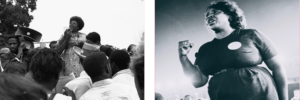“Nobody is Free until everybody’s free…..” -Fannie Lou Hamer.
Fannie Lou Hamer was an unsung voting rights pioneer. She served as a dedicated community organizer that recruited, trained and supported women of all ethnicities and backgrounds to run for elected office in rural Mississippi in the early 1960’s.
She was a resilient, powerful civil rights leader who fought for the right to vote despite being stalked by the Ku Klux Klan, beaten by Mississippi Highway Patrolmen after a voter registration workshop , fired from her job, extorted, threatened, shot at over 15 times and assaulted on numerous occasions; however, through her unwavering bravery and unparalleled perseverance she helped thousands of African Americans secure the right to vote in the state of Mississippi.
After surviving a drive-by shooting by a racist mob, she said: “What is the point of being scared…the only thing they can do is kill me”.
Fannie Lou Hamer fought against voter suppression, bringing many lawsuits against the state of Mississippi until her death at the age of 59 in 1977.
As we celebrate Black History Month, let’s shine a spotlight on the undeniable power of the minority vote and the seismic impact of our collective voices, especially of African American women like Fannie Lou Hamer, who gave so much of her life for freedom and equality.
In 2024, Black women continue to serve as a powerful voting constituency. Exit polls from the 2020 election show African American women’s key issues include, but are not limited to, economic concerns, combating discrimination, and increasing wages.
We have learned from iconic leaders like Fannie Lou Hamer that unity and informed civic engagement remain vital in ensuring a fair electoral process. The ongoing struggle for voting rights requires collective action to shape the future of our democracy.
1. Register to Vote: Ensure you and those around you are registered, emphasizing the importance of active participation.
2. Support Voting Rights Bills: Stay informed about federal voting rights bills like The John Lewis Voting Rights Advancement Act and The Freedom to Vote Act, advocating for their passage.
3. Educate Yourself and Others: Understand the impact of elections on social services and community governance, emphasizing the broader consequences beyond individual votes.
4. Promote Voter Engagement: Host or participate in voter registration drives, text friends once Early Voting begins, and encourage awareness of candidates and issues on the ballot.
By collectively taking these actions, we contribute to safeguarding voting rights and promoting a more inclusive democracy. The ongoing struggle for voting rights requires our united effort to shape the future of our democratic society.






